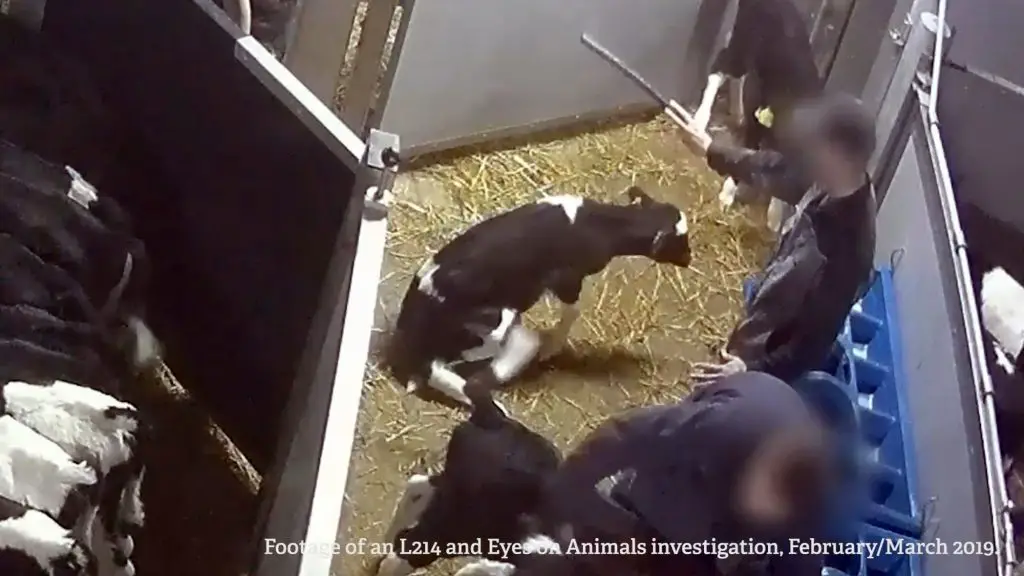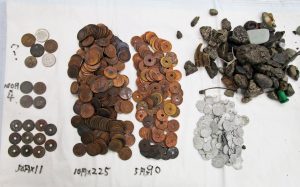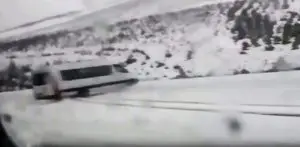Story By: Ernest Bio Bogore, Sub-Editor: Joseph Golder, Agency: Newsflash
WARNING: DISTRESSING CONTENT
Newsflash/L214
This footage shows Irish calves – some dying – being brutally beaten after crossing the sea to France as part of a gruelling 50-hour trip to the Netherlands.
Animal rights organisation L214 released the footage which came from an investigation into the treatment of calves alongside Eyes on Animals, a Dutch animal welfare organisation.
An investigation conducted by L214 and Eyes on Animals at the end of February and beginning of March 2020 shows that calves are transported in trucks from Ireland to the Netherlands with stops in France and Belgium travelling 2,000 kilometres (1,242 miles) over more than 50 hours of transport.

According to L214, 21 cattle trucks were on board the Stena Line ferry, which left the port of Rosslare in Ireland on the evening of Tuesday 3rd March and arrived at the port of Cherbourg in Northwestern France on Wednesday 4th March at 4.30 pm.
Reports say the calves were unloaded at a transit centre in Couville in the Manche department in Normandy in north-western France.
L214 says that the calves are being handled there without any restraint as shown in the images.
The video show workers repeatedly hitting calves that are a few weeks old with sticks. One is kicked and others are hit as they feed on milk.
One of the calves can be seen lying not he ground apparently dead before it is removed with a forklift truck.
L214 reports that after a 13-hour stop, the calves are reloaded into trucks before arriving at their destination at the fattening centre in the north of the Netherlands on Friday 6 March at 1 am.
In a press release, L214 said: “The calves will have travelled more than 2,000 kilometres and crossed 4 countries (Ireland, France, Belgium, the Netherlands), although their young age makes them particularly vulnerable.
“They are stressed, physically challenged, tired, malnourished and undernourished. Some, too weakened, are euthanized along the way.”
Both associations also believe that in the midst of a coronavirus epidemic, animal transport is “irresponsible”.
According to reports, EU law obliges calf transporters to feed and rest calves after nine hours of travel, “if necessary”. After a second nine-hour journey or a total of 18 hours’ transport, calves must be fed and rested for 12 hours.
Sebastien Arsac, co-founder of the L214 association, said: “The transport of calves over long distances is generally intolerable, but that it is maintained during this high-risk period is unconscionable!
“These calves, barely out of their mother’s womb, undergo more than 50 hours of transport in terrible conditions: crammed to 300 in cattle racks on 3 levels, thirsty, violently manipulated, they live a real hell. “
L214 also believes that the transport of calves could contribute to the spread of the coronavirus, saying: “The virus can travel on equipment, it can also be transmitted between the different people involved in the trade: from Irish farmers who sell these calves at livestock markets to international transporters, veterinarians or veterinary inspectors, customs officials, employees of the French transit centre, to fattening farmers”.
Arsac says: “While citizens are being asked to be extremely vigilant and to keep a social distance when most companies have to restrict or suspend their activities, long journeys of absolutely non-essential animals continue to the detriment of everyone’s safety and the protection of animals.
“The French Minister of Agriculture and the European Union must urgently stop long animal transports.”
An unnamed member of L214 said: “The four Irish trucks were carrying about 1,200 calves and when they arrive, they’re desperate for milk. The workers get impatient because they won’t leave the feeders.
“Calves were kicked and whacked repeatedly, particularly around the head with sticks. We saw one collapse, either because of the brutality or because of exhaustion and hunger. Or both.”
According to the reports, on 19th March, 38 European animal welfare NGOs and 42 MEPs sent letters to the European Commission to remind them of the health risks of transporting live animals during a pandemic and the impossibility of guaranteeing the least possible suffering to the animals transported in these times of crisis.
On 31st March L214 reported that they joined these NGOs and MEPs in calling on the European Commission “to immediately ban animal transport over 8 hours. To immediately ban the transport of animals by sea.
“Immediately ban the export of animals to third countries.”
According to The Guardian, Ireland’s Department of Food, Agriculture and the Marine emailed an announcement saying it “continues to undertake inspection/control activities and provide certification to the farming and food sectors, whilst respecting HSE [the Irish health service] public health guidance with regard to hygienic and social distancing protocols.”
The statement also said that if “there is evidence of alleged non-compliances at premises in France, anyone with such evidence should bring the matter immediately to the attention of the authorities there, who can investigate/respond as necessary”.
According to reports, the French government has made no statement on the incident.
The ViralTab page is created by and dedicated to professional, independent freelance journalists. It is a place for us to showcase our work. When our news is sold to our media partners, we will include the link here.



